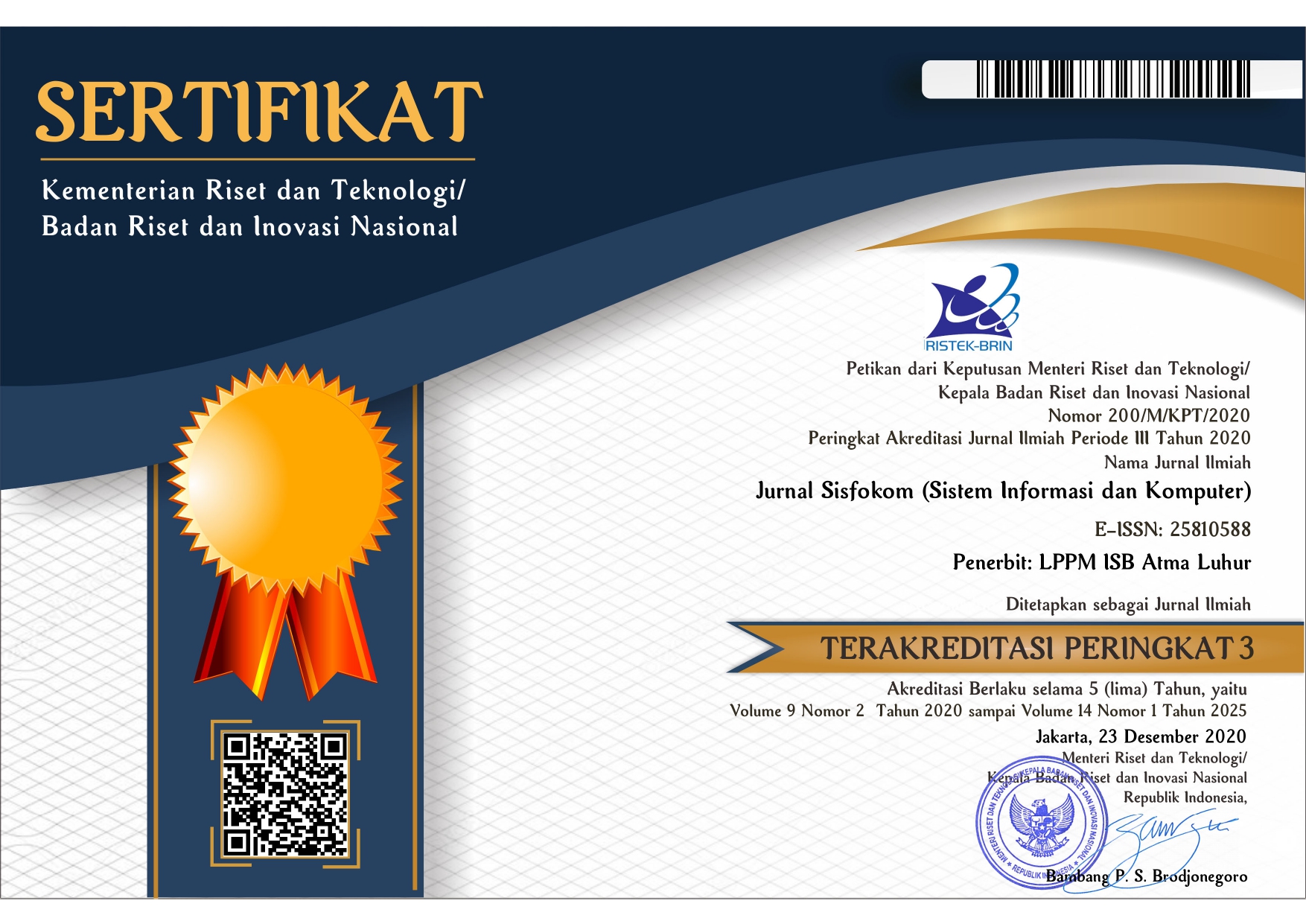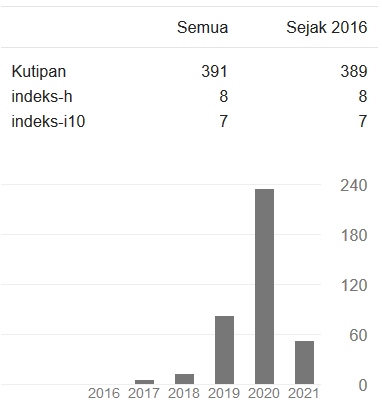Comparison of Sentiment Analysis Model for Shopee Comments on Google Play Store
DOI:
https://doi.org/10.32736/sisfokom.v13i1.1916Keywords:
Shopee, Google Play Store, Sentiment AnalysisAbstract
The current COVID-19 pandemic has greatly changed the order of consumption and the Indonesian economy. During the health crisis that hit Indonesia, the e-commerce sector experienced very rapid development because of changes in consumer behavior that are looking for safe and comfortable shopping alternatives. During the COVID-19 pandemic, Shopee became the number 1 online shopping site in Indonesia. However, this cannot be used as a standard for user satisfaction. User satisfaction can only be measured from comments by Shopee application users through the comments and rating features provided by the Google Play Store. Therefore, to be able to find out public opinion about Shopee, a sentiment analysis of the Shopee application will be carried out which can later be used by management to develop even better applications. In this study, the dataset taken is the rating and reviews of Shopee application users on the Google Play Store using the Multinomial Naïve Bayes method, Random Forest Classifier, Logistic Regression, Support Vector Machine, K-Nearest Neighbors, and Extra Trees Classifier. This study uses 1000 comment and rating data which are processed using the Python language. The results of this study indicate that the method that has the highest level of accuracy is the Support Vector Machine algorithm with an accuracy of 88%, Extra Trees Classifier with an accuracy of 86%, Logistic Regression with an accuracy of 85%, Random Forest Classifier with an accuracy of 85%, K- Nearest Neighbors with an accuracy of 83%, and the last is Multinomial Naïve Bayes with an accuracy of 78%.References
N. R. Yunus and A. Rezki, “Kebijakan pemberlakuan lock down sebagai antisipasi penyebaran corona virus Covid-19,” Salam: Jurnal Sosial dan Budaya Syar-i, vol. 7, no. 3, pp. 227–238, 2020.
A. Putri, A. Pebriani, M. J. Rumi, and J. H. Siregar, “Pemaanfaatan Aplikasi Toko Online Terhadap Kebutuhan Konsumen Selama Pandemi Covid-19,” in Prosiding Seminar Nasional Pengabdian Masyarakat LPPM UMJ, 2021.
A. D. Cahya, F. A. Aqdella, A. Z. Jannah, and H. Setyawati, “Memanfaatkan marketplace sebagai media promosi untuk meningkatkan penjualan di tengah pandemi Covid-19,” Scientific Journal Of Reflection: Economic, Accounting, Management and Business, vol. 4, no. 3, pp. 503–510, 2021.
D. Chong and H. Ali, “Literature Review: Competitive Strategy, Competitive Advantages, and Marketing Performance on E-Commerce Shopee Indonesia,” Dinasti International Journal of Digital Business Management, vol. 3, no. 2, pp. 299–309, 2022.
R. U. Erza, A. M. Ramdan, and N. Norisanti, “Analisis Online Customer Review Dan Seller Reputation Terhadap Keputusan Belanja Online Dimasa Pandemi Covid-19,” Management Studies and Entrepreneurship Journal (MSEJ), vol. 3, no. 3, pp. 1629–1634, 2022.
U. W. Saputra, “The role of user experience towards customer loyalty with mediating role of customer satisfaction at Shopee,” REVIEW OF MANAGEMENT, ACCOUNTING, AND BUSINESS STUDIES, vol. 2, no. 2, pp. 104–113, 2021.
S. Saepudin, S. Widiastuti, and C. Irawan, “Sentiment Analysis of Social Media Platform Reviews Using the Naïve Bayes Classifier Algorithm,” Jurnal Sisfokom (Sistem Informasi dan Komputer), vol. 12, no. 2, pp. 236–243, 2023.
R. Ardianto, T. Rivanie, Y. Alkhalifi, F. S. Nugraha, and W. Gata, “Sentiment analysis on E-sports for education curriculum using naive Bayes and support vector machine,” Jurnal Ilmu Komputer dan Informasi, vol. 13, no. 2, pp. 109–122, 2020.
L. O. Sihombing, H. Hannie, and B. A. Dermawan, “Sentimen Analisis Customer Review Produk Shopee Indonesia Menggunakan Algortima Naïve Bayes Classifier,” Edumatic: Jurnal Pendidikan Informatika, vol. 5, no. 2, pp. 233–242, 2021.
C. Cahyaningtyas, Y. Nataliani, and I. R. Widiasari, “Analisis sentimen pada rating aplikasi Shopee menggunakan metode Decision Tree berbasis SMOTE,” AITI, vol. 18, no. 2, pp. 173–184, 2021.
D. Pratmanto, R. Rousyati, F. F. Wati, A. E. Widodo, S. Suleman, and R. Wijianto, “App Review Sentiment Analysis Shopee Application in Google Play Store Using Naive Bayes Algorithm,” in Journal of Physics: Conference Series, IOP Publishing Ltd, Nov. 2020. doi: 10.1088/1742-6596/1641/1/012043.
F. Bei and S. Saepudin, “Analisis Sentimen Aplikasi Tiket Online Di Play Store Menggunakan Metode Support Vector Machine (Svm),” in Seminar Nasional Sistem Informasi dan Manajemen Informatika Universitas Nusa Putra, 2021, pp. 91–97.
U. Kusnia and F. Kurniawan, “Analisis Sentimen Review Aplikasi Media Berita Online Pada Google Play menggunakan Metode Algoritma Support Vector Machines (SVM) Dan Naive Bayes,” Explore IT!: Jurnal Keilmuan dan Aplikasi Teknik Informatika, vol. 14, no. 1, pp. 24–28, 2022.
F. F. Irfani, M. Triyanto, and A. D. Hartanto, “Analisis Sentimen Review Aplikasi Ruangguru Menggunakan Algoritma Support Vector Machine,” JBMI (Jurnal Bisnis, Manajemen, dan Inform., vol. 16, no. 3, p. 258, 2020, doi: 10.26487/jbmi. v16i3. 8607, 2020.
A. I. Tanggraeni and M. N. N. Sitokdana, “Analisis Sentimen Aplikasi E-Government pada Google Play Menggunakan Algoritma Naïve Bayes,” JATISI (Jurnal Teknik Informatika dan Sistem Informasi), vol. 9, no. 2, pp. 785–795, 2022.
P. Aditiya, U. Enri, and I. Maulana, “Analisis Sentimen Ulasan Pengguna Aplikasi Myim3 Pada Situs Google Play Menggunakan Support Vector Machine,” JURIKOM (Jurnal Riset Komputer), vol. 9, no. 4, pp. 1020–1028, 2022.
M. F. Asshiddiqi and K. M. Lhaksmana, “Perbandingan Metode Decision Tree dan Support Vector Machine untuk Analisis Sentimen pada Instagram Mengenai Kinerja PSSI,” eProceedings of Engineering, vol. 7, no. 3, 2020.
R. Y. L. Lesmana and R. Andarsyah, “Model Klasifikasi Multinomial Naive Bayes Untuk Analisis Sentiment Terkait Non-Fungible Token,” Jurnal Teknik Informatika, vol. 14, no. 3, pp. 135–139, 2022.
D. A. Agustina and F. Rahmah, “Analisis Sentimen pada Sosial Media Twitter terhadap MRT Jakarta Menggunakan Machine Learning,” Insearch: Information System Research Journal, vol. 2, no. 01, pp. 1–6, 2022.
N. L. P. M. Putu and A. Z. Amrullah, “Analisis Sentimen dan Pemodelan Topik Pariwisata Lombok Menggunakan Algoritma Naive Bayes dan Latent Dirichlet Allocation,” Jurnal RESTI (Rekayasa Sistem dan Teknologi Informasi), vol. 5, no. 1, pp. 123–131, 2021.
S. Budiman, A. Sunyoto, and A. Nasiri, “Analisa Performa Penggunaan Feature Selection untuk Mendeteksi Intrusion Detection Systems dengan Algoritma Random Forest Classifier,” SISTEMASI: Jurnal Sistem Informasi, vol. 10, no. 3, pp. 754–760, 2021.
F. Fazrin, O. N. Pratiwi, and R. Andreswari, “Perbandingan Algoritma K-Nearest Neighbor dan Logistic Regression pada Analisis Sentimen terhadap Vaksinasi Covid-19 pada Media Sosial Twitter dengan Pelabelan Vader dan Textblob,” eProceedings of Engineering, vol. 10, no. 2, 2023.
S. Khomsah and A. S. Aribowo, “Text-preprocessing model youtube comments in indonesian,” Jurnal RESTI (Rekayasa Sistem Dan Teknologi Informasi), vol. 4, no. 4, pp. 648–654, 2020.
Downloads
Additional Files
Published
Issue
Section
License
The copyright of the article that accepted for publication shall be assigned to Jurnal Sisfokom (Sistem Informasi dan Komputer) and LPPM ISB Atma Luhur as the publisher of the journal. Copyright includes the right to reproduce and deliver the article in all form and media, including reprints, photographs, microfilms, and any other similar reproductions, as well as translations.
Jurnal Sisfokom (Sistem Informasi dan Komputer), LPPM ISB Atma Luhur, and the Editors make every effort to ensure that no wrong or misleading data, opinions or statements be published in the journal. In any way, the contents of the articles and advertisements published in Jurnal Sisfokom (Sistem Informasi dan Komputer) are the sole and exclusive responsibility of their respective authors.
Jurnal Sisfokom (Sistem Informasi dan Komputer) has full publishing rights to the published articles. Authors are allowed to distribute articles that have been published by sharing the link or DOI of the article. Authors are allowed to use their articles for legal purposes deemed necessary without the written permission of the journal with the initial publication notification from the Jurnal Sisfokom (Sistem Informasi dan Komputer).
The Copyright Transfer Form can be downloaded [Copyright Transfer Form Jurnal Sisfokom (Sistem Informasi dan Komputer).
This agreement is to be signed by at least one of the authors who have obtained the assent of the co-author(s). After submission of this agreement signed by the corresponding author, changes of authorship or in the order of the authors listed will not be accepted. The copyright form should be signed originally, and send it to the Editorial in the form of scanned document to sisfokom@atmaluhur.ac.id.









